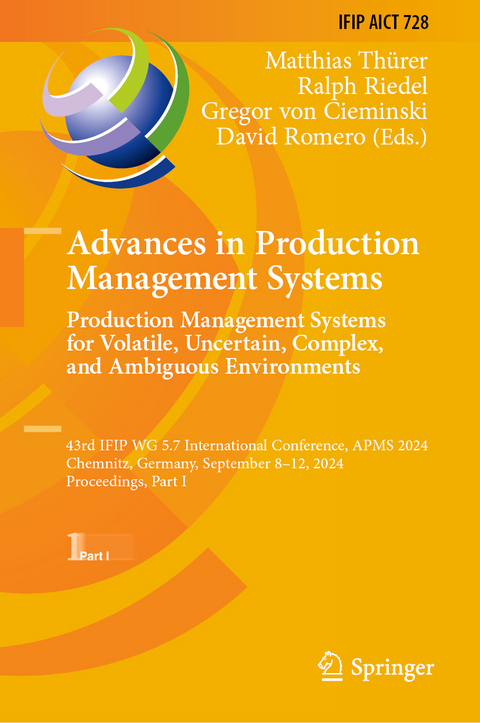
Advances in Production Management Systems. Production Management Systems for Volatile, Uncertain, Complex, and Ambiguous Environments
Springer International Publishing (Verlag)
978-3-031-71621-8 (ISBN)
The six-volume set IFIP AICT 728-729 constitutes the refereed proceedings of the 43rd IFIP WG 5.7 International Conference on Advances in Production Management Systems, APMS 2024, held in Chemnitz, Germany, during September 8-12, 2024.
The 201 full papers presented together were carefully reviewed and selected from 224 submissions. The APMS 2024 conference proceedings are organized into six volumes, covering a large spectrum of research addressing the overall topic of the conference "Production Management Systems for Volatile, Uncertain, Complex, and Ambiguous Environments".
Part I: advancing eco-efficient and circular industrial practices; barriers and challenges for transition towards circular and sustainable production processes and servitized business models; implementing the EU green deal: challenges and solutions for a sustainable supply chain; risk analysis and sustainability in an uncertain system in a digital era.
Part II: smart and sustainable supply chain management in the society 5.0 era; human-centred manufacturing and logistics systems design and management for the operator 5.0; inclusive work systems design: applying technology to accommodate individual workers' needs; evolving workforce skills and competencies for industry 5.0; experiential learning in engineering education.
Part III: lean thinking models for operational excellence and sustainability in the industry 4.0 era; human in command - operator 4.0/5.0 in the age of AI and robotic systems; hybrid intelligence - decision-making for AI-enabled industry 5.0; mechanism design for smart and sustainable supply chains.
Part IV: digital transformation approaches in production and management; new horizons for intelligent manufacturing systems with IoT, AI, and digital twins.
Part V: smart manufacturing assets as drivers for the twin transition towards green and digital business; engineering and managing AI for advances in asset lifecycle and maintenance management; transforming engineer-to-Order projects, supply chains, and systems in turbulent times; methods and tools to achieve the digital and sustainable servitization of manufacturing companies; open knowledge networks for smart manufacturing; applications of artificial intelligence in manufacturing; intralogistics.
Part VI: modelling supply chain and production systems; resilience management in supply chains; digital twin concepts in production and services; optimization; additive manufacturing; advances in production management systems.
.- Advancing Eco-Efficient and Circular Industrial Practices.
.- Material intensity of growing wind turbines.
.- Research Challenges for Eco-Efficient and Circular Industrial Systems.
.- Mapping current research for eco-efficient and circular industrial systems.
.- Exploring Trends and Insights in Industrial Symbiosis Research in Italy: A Bibliometric Approach.
.- Developing a Circular and Resilient Information System: A Design Science Approach.
.- Circular Product Development Framework Enhancing Extended Producer Responsibility - A Medical Device Case Study.
.- Challenges and Enablers for Textile SMEs Towards Circular Production Systems.
.- Upcycling of Food Waste through Bioconversion by Insect Larvae: Conceptual Model and Research Agenda for a Circular Food Supply Chain.
.- Energy efficiency and improvement needs in Swedish manufacturing SMEs.
.- Exploring theoretical perspectives on the relationship between the reporting of circular economy initiatives and financial performance in the German context.
.- Exploring the impact of circular strategies in manufacturing: Can they ensure sustainability?.
.- Investing Ahead - Industrial outlook on circularity within production development.
.- Smart Battery Circularity: Towards Achieving Climate-Neutral Electrification.
.- Cybersecurity Integration in the Circular Economy: Maximizing Sustainability in Industry 4.0.
.- WEEE Flow for Magnets.
.- Barriers and Challenges for Transition towards Circular and Sustainable Production Processes and Servitized Business Models.
.- Towards a service marketplace to empower circular economy transition: An example application in the supply chain of textile industry.
.- Exploring Servitization in Building Technology: The Case of Piping Systems.
.- Market needs for a circular transition: implemented practices and required skills.
.- Barriers and challenges toward the servitization of the machinery sector: evidence from theory and practice.
.- Designing and implementing second life for electric vehicle batteries: An integrated framework to navigate ecosystem actors towards circularity.
.- Implementing the EU Green Deal: Challenges and Solutions for a Sustainable Supply Chain.
.- Smart Port Sustainability: A Business Intelligence Framework for CO2 Reduction in Cargo Truck Operations.
.- Enhancing Logistics Performance: Integrating Ports, Custom Clearance, Digitalization, and European Product Passport.
.- A holistic framework to enhance sustainable development and reporting in corporate sustainability.
.- Supply Chain Collaboration to Mitigate Food Loss and Waste In Food Supply Chain: A Literature Review.
.- Characterising the relationship between environmental sustainability and resilience in manufacturing.
.- Toward the European Union 2030 Strategy for textiles: a review.
.- An association analysis of Digital Technologies in Circular Economy scenarios.
.- Do we really need simulation for a transition towards Circular Supply Chain Management? A possible answer from scientific literature.
.- Addressing Supply Chain's Circularity Through Simulation: Textile Waste Separate Collection Models.
.- Risk Analysis and Sustainability in an Uncertain System in a Digital Era.
.- An Exploratory Survey on the State of Supply Chain Visibility in Portugal.
.- Instant Green Design event for emergency redesign.
.- A correlated redefinition of the concept of resilience in a production system.
| Erscheinungsdatum | 08.09.2024 |
|---|---|
| Reihe/Serie | IFIP Advances in Information and Communication Technology |
| Zusatzinfo | XIV, 488 p. 84 illus., 68 illus. in color. |
| Verlagsort | Cham |
| Sprache | englisch |
| Maße | 155 x 235 mm |
| Themenwelt | Informatik ► Weitere Themen ► Hardware |
| Schlagworte | Advanced Management Systems • Advanced Production Systems • Collaborative Manufacturing & Services • Data-driven Production Management • Digital Supply Networks • Production Management Theory • Smart Manufacturing and Industry 5.0 • Sustainable & Responsible Management |
| ISBN-10 | 3-031-71621-3 / 3031716213 |
| ISBN-13 | 978-3-031-71621-8 / 9783031716218 |
| Zustand | Neuware |
| Haben Sie eine Frage zum Produkt? |
aus dem Bereich


